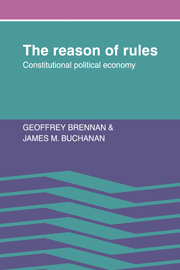Book contents
- Frontmatter
- Contents
- Preface
- 1 The constitutional imperative
- 2 The contractarian vision
- 3 The myth of benevolence
- 4 Modeling the individual for constitutional analysis
- 5 Time temptation, and the constrained future
- 6 Politics without rules, I: Time and nonconstrained collective action
- 7 Rules and justice
- 8 Politics without rules, II: Distributive justice and distributive politics
- 9 Is constitutional revolution possible in democracy?
- Index
6 - Politics without rules, I: Time and nonconstrained collective action
Published online by Cambridge University Press: 05 November 2011
- Frontmatter
- Contents
- Preface
- 1 The constitutional imperative
- 2 The contractarian vision
- 3 The myth of benevolence
- 4 Modeling the individual for constitutional analysis
- 5 Time temptation, and the constrained future
- 6 Politics without rules, I: Time and nonconstrained collective action
- 7 Rules and justice
- 8 Politics without rules, II: Distributive justice and distributive politics
- 9 Is constitutional revolution possible in democracy?
- Index
Summary
Introduction
In the preceding chapter, we attempted to demonstrate that individual behavior in collective choice is likely to reflect shorter time horizons than comparable behavior in private or individualized choice, and for individually rational reasons. The person who may be willing to wait privately, to behave with prudence in order that he or his heirs may secure the fruits of long-term investment in human or nonhuman capital may, at the same time, be unwilling to wait collectively, as reflected in expressions through political decision-making institutions. Because of the necessary attenuation of individually identifiable rights or shares in the fruits of collective or governmental “investment,” individual time horizons in politics are shortened. If this underlying hypothesis is valid, it would follow that as modern societies have become increasingly collectivized or politicized, there has been a shift toward a higher discount rate implicit in the allocation of the economy's resources.
In this chapter we shift our attention to the less abstract and more practical level of real-world politics. But we should stress that we do not go all the way; we dare not enter the realm of historical or descriptive institutional detail. In a sense, our discussion remains abstract in that we examine the predicted workings of idealized models of politics in democracies as these models might be expected to work in confrontation with the problems of modern experience.
- Type
- Chapter
- Information
- The Reason of RulesConstitutional Political Economy, pp. 82 - 96Publisher: Cambridge University PressPrint publication year: 1986



